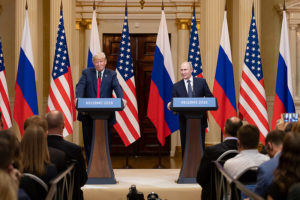
President Donald J. Trump and President Vladimir Putin of the Russian Federation hold a joint press conference | July 16, 2018 (Official White House Photo by Andrea Hanks)
For most of Donald Trump’s presidency, he was forced to defend himself from a baseless inquiry into his ties with Russia (none were found). He was ridiculed, wrongly, as Putin’s pawn, and suggestions were made that he was captured by salacious Russian “kompromat,” or compromising information. Despite it all, suggests Mary Kissel at Spectator World, Trump was tougher on Russia than Biden has been. She writes:
Vladimir Putin’s new year is off to quite a start. The Russian autocrat isn’t just massing troops on the Ukraine border, kicking off a diplomatic panic in European capitals and in Washington. In recent days he’s also backed a refugee stand-off with Poland, helped Kazakhstan’s strongman squelch pro-democracy protests, maintained a presence in Assad’s Syria, established new footholds in Mali and Central African Republic, cozied up to communist China, and, in a nod to Khrushchev, hinted he might build military infrastructure in Cuba and Venezuela.
What’s remarkable about this geographically expansive, chaos-inducing, dangerous spectacle is that it was entirely avoidable.
Mr. Putin is no cipher. He is a son of the former Soviet Union, a system that was steeped in lies and sustained by violence, an experience that shaped his leadership style. Any threat to his power at home, by a political opponent or too-inquisitive journalist, is put down immediately. Abroad, any democratic movement on Russia’s periphery, be it in Georgia, Ukraine, or elsewhere, is rapidly undermined by Russian military power or proxies like the Wagner Group. This is not a man who responds to diplomatic niceties or craves adoration from Davos Man. Mr. Putin is more accurately understood as a corrupt thug with a nuclear arsenal and oil rigs.
These commonsense insights were internalized during the Donald Trump era, to great effect. When the 45th president met Putin in Helsinki in July 2018, many critics (full disclosure: myself included) panned the display as a too-friendly rapprochement with the Russian. What they (and I) failed to understand was the bigger picture: President Trump and his national security team had constructed a larger strategic framework to constrain Putin’s worst instincts while bolstering American national security.
American deterrence laid the foundation. From the very beginning of his administration, President Trump made clear that the use of force was never off the table. Recall the threat of “fire and fury” against North Korea dictator Kim Jong-un? Or the “mother of all bombs” that the Trump Pentagon dropped on militants in Afghanistan? Or the remarkably effective “maximum pressure” campaign on the Islamic Republic of Iran? All were of a piece with a larger strategy of rebuilding a military deterrent, which Barack Obama had dangerously eroded in almost every major theater.
Then there was the economic lever. Republican administrations are generally friendlier to risk-taking and capital investment than their Democrat counterparts, but Trump was especially so. His four years of regulatory pruning and pro-exploration policies facilitated an explosion in energy production and job creation, resulting in two remarkable feats: transforming the US into the world’s largest oil and natural gas producer, and making the US a net energy exporter for the first time in 70 years. The cost of energy, which impacts every manufactured good’s price, tumbled and American economic growth surged.
The Trump energy boom reduced the OPEC cartel’s pricing power, reducing the flow of rubles into Mr. Putin’s coffers and allowing the administration to credibly increase political pressure on nations like Germany to wean themselves off of Russian energy supplies. American diplomats fanned out across Europe to encourage the Three Seas Initiative and the East-West natural gas pipeline across the Mediterranean, a joint project between Greece, Israel, and Cyprus.
I personally witnessed former secretary of state Mike Pompeo’s meetings with his Croatian and Slovenian counterparts, where energy security was a major topic of discussion. Our goal was to develop multiple alternatives for our European friends to diversify their energy sources and build relationships with more reliable (read: non-Russian) suppliers — preferably American. Can you imagine such a discussion happening today?
Of course not. And that’s the strategic 180-degree lurch upon which Putin has seized. Joe Biden hasn’t just been anti-fossil fuel production, shuttering American pipelines and walling off swathes of Alaska to oil exploration and production, giving Mr. Putin a much-needed cash infusion. In his first year, President Biden and his team have also accommodated many key Russian demands, from renewing the New START treaty, to withdrawing American opposition to the Nordstream II pipeline, to engaging in multiple rounds of diplomatic talks with Messrs. Putin and Foreign Minister Sergei Lavrov without anything to show for it.
If you’re willing to fight for Main Street America, click here to sign up for my free weekly email.




